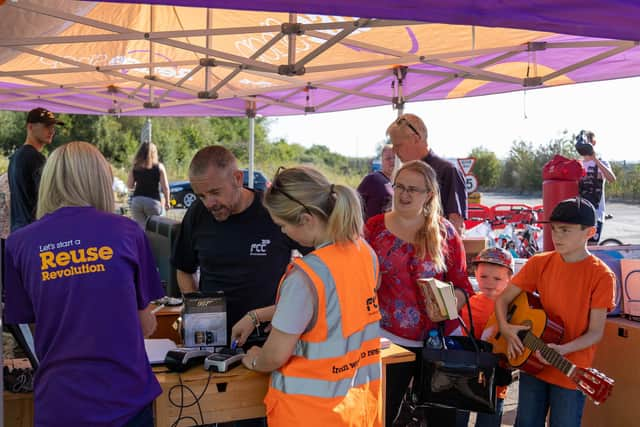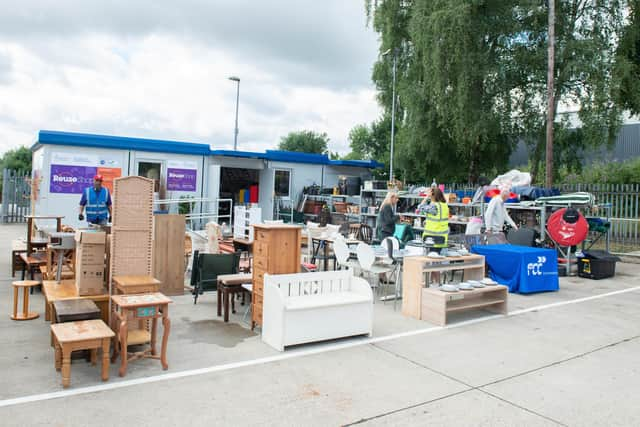Sustainable Scotland: How your unwanted or broken stuff could be saved from the skip and get a new lease of life
With Christmas just around the corner, there may be the temptation for most households to have a mini clear-out of underused items in anticipation of all the gifts we may receive.
But before you reach for the black bin bags or recycling bin, take a moment to pause and ask yourself if that broken toy, bike or piece of furniture in a dark corner can actually be fixed?
Advertisement
Hide AdAdvertisement
Hide AdAs household budgets are increasingly squeezed, and people are continuing to look for new ways to save money, the debate over our ‘throwaway culture’ has never been more evident right now.
When it comes to dealing with waste we are a nation conditioned to ensuring everything is put in the correct-coloured bin. While recycling will always have a key part to play in reducing our footprint on the planet, it is only part of the solution. There must be a sizeable cultural shift in encouraging more of us to first make do and reuse.
The popularity of the BBC’s The Repair Shop, with Jay Blades, has helped fuel the public’s appetite for what is commonly known as ‘reuse and repair’. Almost seven million of us tuned in to watch the appearance of HM King Charles III on the show. Filming took place at Dumfries House, Ayrshire, where students from his Prince’s Foundation Building Craft Programme – a training initiative that teaches traditional skills such as stonemasonry and wood carving – are based.
Our research reveals a shift in the mindset of the public in embracing this concept. There is a growing desire for reusing items, with recent FCC Environment polling showing that almost 80 per cent across the UK agree that all household waste recycling centres (HWRCs) should have a reuse charity shop on site or nearby.
Coming into effect in the summer of 2023, legislation for a ‘right to repair’ is a promising start. It will require manufacturers to make spare parts and repair information for their goods readily available. However, the delay in its implementation and the restriction of its application renders it less effective than it could be. We believe the government could go further and encompass smaller, everyday electronic items in the legislation and so further reduce waste.


There is also scope to introduce initiatives that support the opening of repair cafés – similar to the Welsh government’s scheme to open one in every community, making repair much more accessible and further cutting waste.
The phenomenon is not new in Scotland – Zero Waste Scotland is supporting the development of three regional reuse and repair hubs in the Highlands, Edinburgh and Argyll and Bute. Funding is also being provided for third-sector organisations across the country to access repair training courses on everything from furniture to textiles and electronics.
The reuse sector in Scotland is already worth around £244 million per annum to the economy, reusing around 89,000 tonnes of material and employing more than 6,000 people. However, with Zero Waste Scotland estimating that up to 150,000 tonnes of re-usable materials are currently either being disposed of or otherwise being sent to lower-value recycling, there is so much more that can be done.
Advertisement
Hide AdAdvertisement
Hide AdReuse offers the greatest carbon benefit of all the waste management solutions. In 2020, the UK reused a staggering 3.4 million items, generating an equivalent carbon dioxide saving of 123,236 tonnes.


There must be a radical rethink among the public of how we see the ‘waste hierarchy’, which Defra defines as ranking waste management options according to what is best for the environment.
Reuse must become a key pillar of the circular economy. Top priority is preventing waste in the first place, so that means not filling up your bins with items that can be reused.
FCC Environment is committed to diverting as much material as possible for reuse – year-on year we increase our reuse capacity. We have trialled pop-up shops and innovative ways to make drop-off for reuse more appealing, as well as opening repair cafes, giving people the skills they need to repair items themselves.
For example, FCC Environment operates 11 recycling centres across Suffolk. In 2019, more than 400 tonnes were sold through the on-site reuse shop. In Dalkeith, outside Edinburgh, FCC Environment – in partnership with the City of Edinburgh and Midlothian Councils – operates the Millerhill Recycling and Energy Recovery Centre.
This is just the tip of the iceberg. Our polling showed that almost 60 per cent of people said they would be more likely to donate than throw away their good-quality, second-hand items if they knew they would be resold at a reuse shop.
As we try to move away from our throwaway culture it is heartening to see there is a willingness among people to make do rather than purchase something new.
However, there remains a lack of joined up thinking across the UK. But as a start we will be pushing for progress on this within the industry to develop a formal ‘carbon reduction’ metric that recognises the value of this work.
Advertisement
Hide AdAdvertisement
Hide AdSo, give an extra thought this festive season on how you can help save our planet, while making a few savings, one bargain at a time.
Julie Fourcade is head of external affairs at UK waste management firm FCC Environment
Comments
Want to join the conversation? Please or to comment on this article.